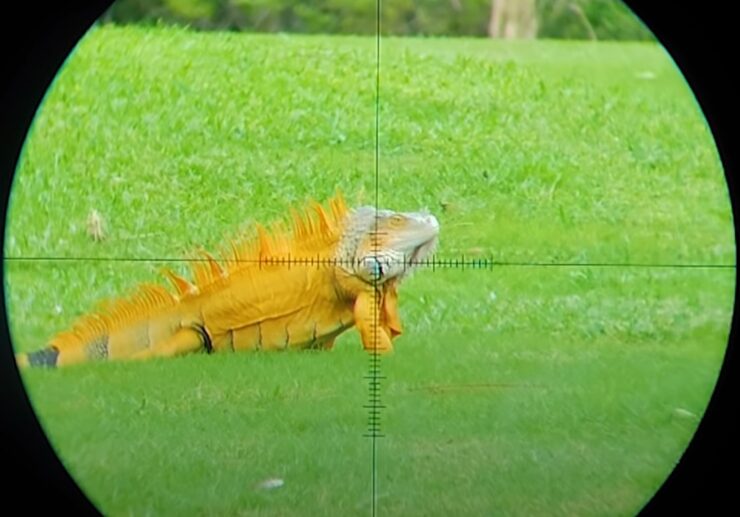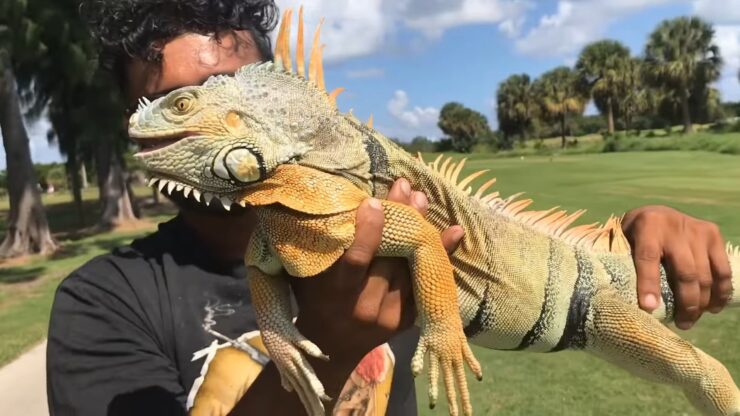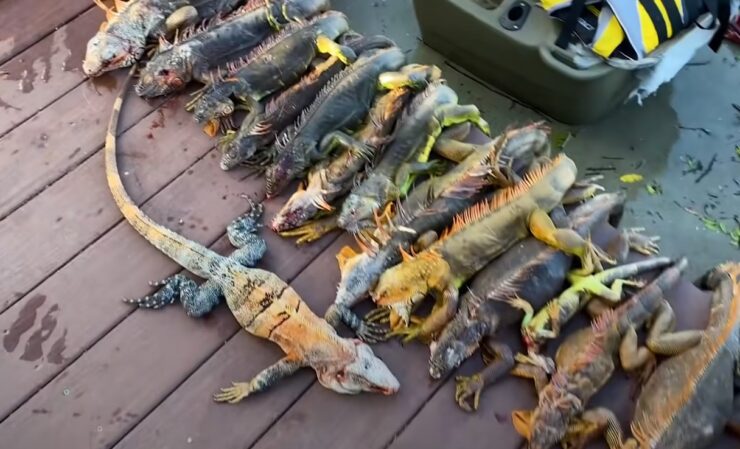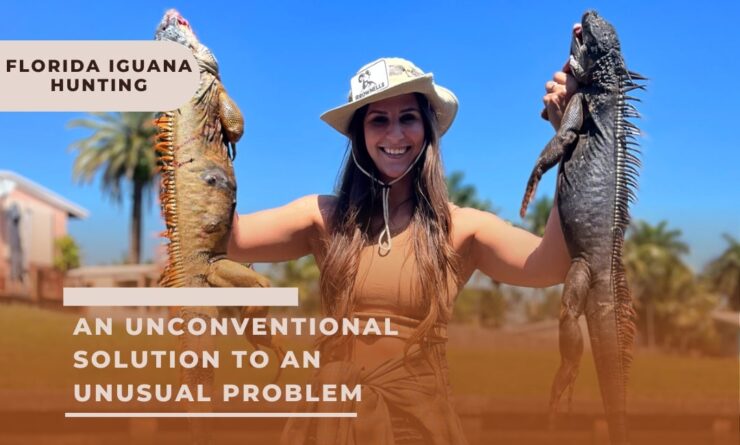Florida, the Sunshine State, is known for its beautiful beaches, vibrant culture, and diverse wildlife. However, it’s also grappling with an unexpected problem: an invasion of iguanas.
These reptiles, native to Central and South America, have found a comfortable home in Florida’s warm climate. The state’s residents and authorities have turned to an unconventional solution to this problem: iguana hunting.
This practice, while surprising to some, has become a necessary measure to protect Florida’s unique ecosystems and maintain the balance of its wildlife populations.
The Iguana Invasion: Understanding the Problem
Iguanas were first introduced to Florida as exotic pets. However, over time, some of these pets either escaped or were released into the wild. With no natural predators and a favorable climate, the iguana population exploded. This rapid increase in iguana numbers has led to a host of problems, prompting the state to take action.
The Impact on Florida’s Ecosystem
Iguanas have become a significant nuisance in Florida. They damage landscapes, burrow into sidewalks, and even cause power outages by climbing onto electrical lines.
More importantly, they pose a threat to native flora and fauna by consuming large amounts of vegetation and disrupting natural habitats. The impact of this invasive species extends beyond mere inconvenience, threatening the health and diversity of Florida’s ecosystems.
Legal Aspects
In response to the iguana problem, the Florida Fish and Wildlife Conservation Commission (FWC) has encouraged homeowners to kill iguanas on their property whenever possible.
It’s important to note that while iguana hunting is legal, it must be done humanely, following the American Veterinary Medical Association’s guidelines. This approach ensures that the iguanas are dealt with in a way that minimizes suffering and respects the value of all life.
Necessary Permits and Licenses
Currently, no special permit or license is required to hunt iguanas in Florida. However, if you plan to hunt on public lands, you may need permission from the appropriate authorities. This regulation ensures that iguana hunting is conducted responsibly and does not interfere with other activities or wildlife in public areas.
Hunting Process

Iguana hunting doesn’t require sophisticated equipment. A simple pellet gun or a catch pole (a long pole with a loop at the end) can be effective. Some hunters even use a fishing pole with a noose at the end.
Regardless of the method used, it’s important to ensure that the equipment is handled safely and responsibly to prevent harm to the hunter or unnecessary suffering for the iguana.
Techniques and Strategies for Successful Hunting
Iguanas are cold-blooded animals, so they are most active during the day when it’s warm. They can often be found sunning themselves on tree branches, seawalls, or roofs. A good strategy is to approach slowly and aim for a quick, humane kill. Patience and precision are key in this process, ensuring that the hunt is effective and humane.
Safety Measures

While iguanas are not typically aggressive, they can bite or whip their tails if they feel threatened. It’s important to handle them carefully to avoid injury. Additionally, hunters should be aware of their surroundings to avoid accidents or disturbances to other wildlife or people in the area.
Safety Precautions to Take
Always wear protective gloves and long sleeves to protect yourself from scratches or bites. If you’re using a pellet gun, be sure to follow all safety guidelines to prevent accidents. It’s also important to be mindful of others in the area, particularly in residential or public spaces, to ensure that the hunting activity does not pose a risk or nuisance to others.
Iguana Hunting as a Business
The rise of the iguana problem has led to the emergence of professional iguana hunting services. These businesses are hired by homeowners, property managers, and even municipalities to control the iguana population.
This new industry is contributing to Florida’s economy, providing jobs and services to those affected by the iguana invasion. It’s a clear example of how a problem can also present opportunities, leading to innovative solutions that benefit both the economy and the environment.
Ethical Considerations

While iguana hunting is a necessary measure to control the population of this invasive species, it’s crucial to consider the ethical implications of this practice. The goal is not to eradicate iguanas, but to manage their numbers in a way that minimizes their impact on Florida’s ecosystems.
This must be done in a manner that respects the welfare of the iguanas. They are, after all, living creatures that are simply trying to survive in an environment that they have been introduced to, often through no fault of their own.
Ethical Ways to Hunt and Kill
The Florida Fish and Wildlife Conservation Commission (FWC) emphasizes that iguanas should be killed humanely. This means causing immediate death with minimal pain or distress.
The American Veterinary Medical Association (AVMA) provides guidelines on how to achieve this, recommending methods such as stunning followed by decapitation or a penetrating captive bolt.
It’s important for anyone engaging in iguana hunting to familiarize themselves with these guidelines and adhere to them strictly. This ensures that the iguanas are treated with respect and dignity, even in death.
FAQ
How can I get involved in iguana hunting?
If you’re interested in getting involved in iguana hunting, you can start by educating yourself about the iguanas and their impact on Florida’s ecosystem.
Familiarize yourself with the legal and ethical guidelines for iguana hunting, and ensure you have the necessary equipment. You could also consider reaching out to professional iguana hunting services to learn from their expertise or even join their team.
Are there alternatives to iguana hunting for controlling their population?
Yes, there are alternatives to iguana hunting for controlling their population. These include habitat modification (making the environment less attractive to iguanas), trapping, and sterilization. However, these methods can be more costly and time-consuming than hunting, and may not be as effective in reducing large iguana populations.
How can I ensure that I’m hunting iguanas ethically?
To ensure that you’re hunting iguanas ethically, it’s important to familiarize yourself with and adhere to the American Veterinary Medical Association’s guidelines for humane killing.
This means causing immediate death with minimal pain or distress. It’s also important to respect the environment and other wildlife while hunting and to consider the broader impact of your actions on the ecosystem.
What are the potential impacts on other wildlife from iguana hunting?
Iguana hunting, if done responsibly, should have minimal impact on other wildlife. The primary goal is to reduce the iguana population and thereby lessen their impact on native species and habitats.
However, hunters should always be mindful of their surroundings and take care not to disturb other wildlife or their habitats during the hunting process.
How can the public be educated about the iguana problem and the need for hunting?
Public education is crucial in managing the iguana problem in Florida. This can be done through community workshops, informational materials, and media campaigns.
These efforts should aim to inform the public about the impact of iguanas on Florida’s ecosystems, the reasons for hunting, and how to hunt iguanas responsibly and humanely. It’s also important to educate pet owners about the risks of releasing exotic pets into the wild, to prevent similar problems in the future.
Conclusion
Iguana hunting in Florida is more than just an unusual pastime. It’s a necessary measure to protect the state’s ecosystem from the damaging effects of these invasive reptiles. As we look to the future, it’s clear that iguana hunting will continue to play a crucial role in Florida’s wildlife management strategies.
However, it’s equally important to promote responsible pet ownership and prevent the release of exotic species into the wild, to prevent similar problems from arising in the future.













